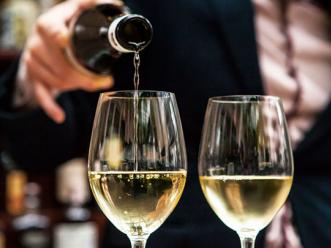Setting aside the surplus of uppish “authorities” on wine, who use their knowledge to cloak it in an exclusionary and intimidating mystery, wine, in and of itself, is a complex and mysterious substance. It is no small matter that Robert Louis Stevenson was inspired to the comparison : “Wine is bottled poetry.” For, like poetry, wine is concentrated expression. Within its dark reaches we may encounter any number of mercurial impressions, odors transporting us back in time, elements of surprise, and sensory revelations. A wine, like a poem, is never exactly the same wine twice. Not only is each person’s experience contingent upon his or her individual mood, memory, and sense of smell, but a wine, too, as a living, changing substance, is also subject to varying characteristics within a given period of time.
While complex and adventurous exchanges between a wine and its taster hold great promise, they can also be infinitely daunting. As a veteran of the restaurant industry, I’ve attended countless wine tastings and accumulated mountains of notes pertaining to wines and their characteristics. But there was no one more intimidated than I was when I first started learning about wine. Monthly tastings at work caused me to break out in monthly cold sweats. I dreaded the moment I might be called on to decode a message I didn’t quite know the code for. Wine seemed to me a vast, incomprehensibly foreign, and unfriendly country, in which I could only stammer out the most rudimentary phrases. I felt inferior in that country, and it was for this reason precisely that I was always hesitant to return.
My perception of wine as an impenetrable science changed quite suddenly and unexpectedly during my first blind tasting. It was there that I first tasted wine. No longer relying on the notes in front of me telling me what I should be tasting, I inquired of my own palate. Without the “known values” of the wine to intimidate and confuse me, the elements of the wine began revealing themselves to me in their own fashion. It took tasting blind for me to realize that the power of suggestion is strong enough to all but eclipse the private and complicated exchange between a wine and the person tasting it.
At tastings in which we had been influenced by the known values of the wine we were tasting, i.e. the reputation of the winemaker, its popularity among the industry experts, etc., it was already decided before we tasted it whether it was a worthy wine or not. And its perceived worthiness, for me at least, rendered my own perceptions irrelevant.
While I can communicate the characteristics of a wine to the diners who enlist my help in making the right choice for their dining experience, my heartiest recommendation cannot guarantee a perfect match. The uncertainty inherent in choosing a bottle of wine is a matter of anxiety for a number of the people I meet, and what this anxiety most often leads to is a general resistance to unfamiliar wines or unusual varietals. And while there is nothing inherently wrong with sticking with wines that we know, it greatly limits the possibilities of what we might discover if we were more willing to experiment.
The way to being more adventurous tasters is in learning to trust ourselves. And we are much more likely to trust our own impressions when we are not swayed by preconceived notions of how something should taste. Tasting wine blind is a fantastic way to practice and develop our ability and vocabulary to discern and articulate exactly what we are perceiving, to discover exactly what we like and don’t like. And while the demystification of wine tasting may go hand in hand with trusting one’s palate, fortunately there is little danger of ever stripping wine, even marginally, of its infinite mystery.






